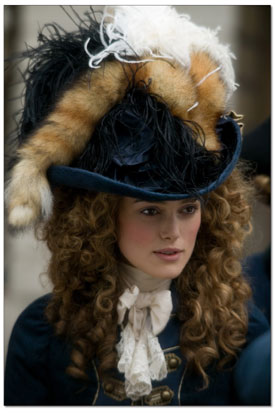|
| ||
| Dining with the duchess
by Judith Reynolds One day at yet another eight-course, ho-hum luncheon, a small roasted pigeon is served to Georgiana, Duchess of Devonshire. You barely see this little detail, but you know the dream is over. The scene, which comes late in “The Duchess,” contrasts a tense, formal meal upstairs with chaos downstairs. It’s not overcooked, like the poor pigeon. It’s barely suggested. But the details of the menu complete the trap Georgiana Spencer (Keira Knightley) finds herself in. A simple servant’s gesture sets up another handoff later – with tremendous consequences. One is subtle; the other wrenchingly dramatic. Both are cinematic jewels. Director Saul Dibb serves up many more in this biopic based on the life of a real Brit. The historic Georgiana was born in 1757 and lived to the ripe old age of 49. On the outside, her early contractual marriage to the most powerful peer in England looked like a dream. On the inside, it was a nightmare. The Duke (Ralph Fiennes) is a dolt. Bored, entitled and intellectually limited – a helluva combination – wants only two things: loyalty and a male heir. He speaks directly about all that. So does Georgiana’s mother, Lady Spencer (Charlotte Rampling), the other arch realist in the film. Custom, status and doing what is expected constitute the rules of engagement. Husband and mother agree and constitute a solid phalanx against the youthful Georgiana. She holds onto the old romantic belief that marriage is about love, and life is about living happily ever after. A Disney version would have delivered just that. But “The Duchess” claims status as biography, and Georgiana’s tumultuous life took a more realistic path: not marital bliss, not freedom, not having fun, and certainly not doing what one pleases. Those were Georgiana’s stars, and they guided her into the stormy seas of conflict with the real world she inhabited. It’s an old story, but what’s unexpected in this film is the blunt dialogue about expectations. The Duke uses no subterfuge, nor does the mother. They keep reminding Georgiana about duty and appearances. Georgiana’s one and only friend, Lady Elizabeth Foster (Hayley Atwell) may suggest ways around the blue book’s rigid guidelines, but she, too, is frank about consequences – and brutally truthful about some unnerving household events. No one could say Georgiana didn’t understand the book of rules. For all the stiff conversations and gorgeous formal occasions, there’s a good deal of edgy realism, and it’s refreshing. In her various confrontations, Georgiana consistently speaks truth to power and continues to spawn more trouble for herself. The irony of the film is that she takes so long to “get it.” Knightley conveys the Duchess’ struggle and is especially affecting in the tumultuous handoff scene. As she is schooled in the social norms of her time, her once youthful playfulness darkens. As the Duke, Fiennes is a nasty bit of work, the snotty aristocrat you love to hate. As Lady Spencer, the cool mother of opportunity, Rampling understands the game and tries to convince her naïve daughter to adjust to society’s dictates. Georgiana’s 18th-century dilemma uncomfortably parallels the life of Princess Diana. She, too, inherited the same double-edged dream sword. No wonder the film has been made at the 10-year anniversary of Diana’s death. Her popular sainthood has all but been established, and “The Duchess” in a way confirms it. That said, the film also tells a larger story about the one and the many, about an individual caught in the snares of social norms. It’s this struggle that makes the film so gripping. Add to that the low status of women in the late 18th century – seen as mere property at the time. Layered into the film through abolitionist Charles Fox, a friend of the Duchess, the slave trade rears its ugly head to give a larger perspective. For those who love costume dramas, there’s plenty to feast on here. The wigs alone get bigger and more spectacular as games of status intensify. In Georgiana’s only public meltdown, her enormous wig catches fire. But even that public embarrassment doesn’t compare to taking a lover to foolishly equalize the board game her husband plays so well. Not to give anything away, Georgiana, like Diana, had to come to terms with the world in which she lived. The only false note is one quiet scene toward the end between the Duke and Duchess. To me, this smacked of a Hollywood ending. For a moment, the film seems to sell out for that good old, American need for a happy resolution. In a brief epilogue, watch for a final handoff – a latter day reward for Georgiana. Under a rollicking scene of children at play, a little historic information flashes across the screen. When the Duchess of Devonshire is served her final course, it isn’t roasted pigeon. It’s something else, and it’s yours to decide whether it’s sour grapes, whipped cream or just desserts. •
|
In this week's issue...
- January 25, 2024
- Bagging it
State plastic bag ban is in full effect, but enforcement varies
- January 26, 2024
- Paper chase
The Sneer is back – and no we’re not talking about Billy Idol’s comeback tour.
- January 11, 2024
- High and dry
New state climate report projects continued warming, declining streamflows


